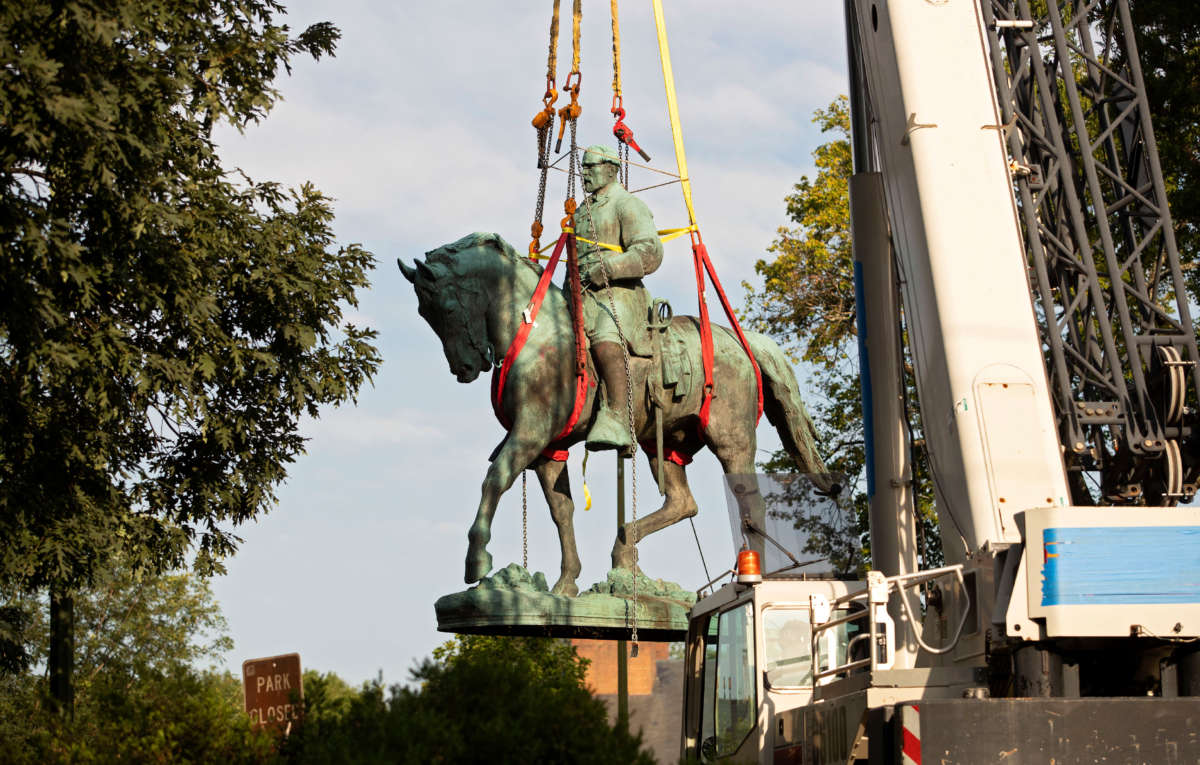A statue of Confederate General Robert E. Lee in Charlottesville, Virginia, will be melted down and turned into a public art exhibit, four years after white supremacists stormed the city in a rally that resulted in the killing of Heather Heyer, an anti-racist counterprotestor.
Several bids for the statue came about after the city removed it in July. This week, the city council ultimately voted 4-0 to hand over the monument to the only local group that placed a bid: the Jefferson School African American Heritage Center, a museum whose mission “is to honor and preserve the rich heritage and legacy of the African American community” in Charlottesville, Virginia.
The project, titled “Swords Into Plowshares,” will seek public input from Charlottesville residents to determine what the art piece should look like. But ultimately, the project will aim to “allow Charlottesville to contend with its racist past,” said museum executive director Andrea Douglas, speaking to The Washington Post.
“It really is about taking something that had been harmful and transforming it into something that is representative of the city’s values today,” Douglas said.
“What can you generate out of trauma, so you end up with something that is reflective of our contemporary moment?” she added.
The Lee statue became a topic of national debate after proposals to remove it led to neo-Nazis and white supremacists from across the country descending upon Charlottesville in August 2017. Participants of the “Unite the Right” rally began attacking counterprotesters, eventually resulting in the murder of anti-racist activist Heather Heyer.
After years of debate and litigation, the Virginia Supreme Court ruled last spring that the city had the right to remove the statue, in spite of claims made by descendents of the family that once owned the land where the monument stood. The city removed the Lee statue along with one honoring another Confederate general, Stonewall Jackson, this past summer.
Takyah Thompson, an activist who helped topple a Confederate statue in Durham, North Carolina, after the “Unite the Right” violence erupted in Charlottesville, said that removing monuments depicting enslavers and colonizers is an important step — even if it doesn’t address the material conditions resulting from ongoing institutional racism in the U.S.
“Creating a world where cultural racism is not okay is an important first step to tearing down more structural forms of racism,” said Thompson, speaking to Truthout in October 2017. “It’s an act of the oppressed reclaiming their agency. So even though it was just a statue and people have made the criticism of ‘Oh well, let me know when you tear down a prison,’ well obviously, that’s the next step. That would be the end goal, but it’s important for oppressed people to have these small victories in the long road to liberating themselves.”
Our most important fundraising appeal of the year
December is the most critical time of year for Truthout, because our nonprofit news is funded almost entirely by individual donations from readers like you. So before you navigate away, we ask that you take just a second to support Truthout with a tax-deductible donation.
This year is a little different. We are up against a far-reaching, wide-scale attack on press freedom coming from the Trump administration. 2025 was a year of frightening censorship, news industry corporate consolidation, and worsening financial conditions for progressive nonprofits across the board.
We can only resist Trump’s agenda by cultivating a strong base of support. The right-wing mediasphere is funded comfortably by billionaire owners and venture capitalist philanthropists. At Truthout, we have you.
We’ve set an ambitious target for our year-end campaign — a goal of $240,000 to keep up our fight against authoritarianism in 2026. Please take a meaningful action in this fight: make a one-time or monthly donation to Truthout before December 31. If you have the means, please dig deep.
